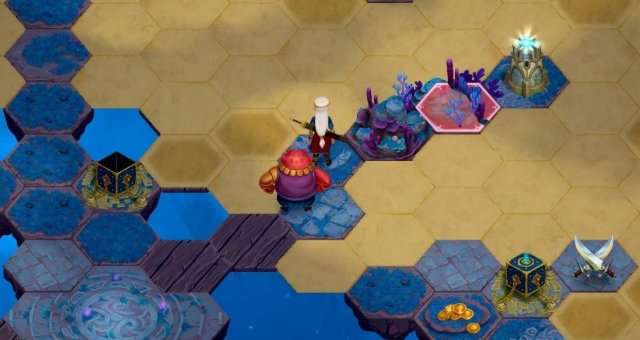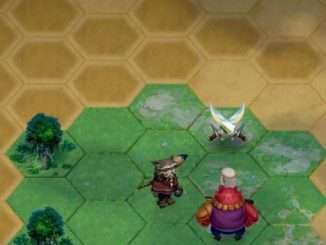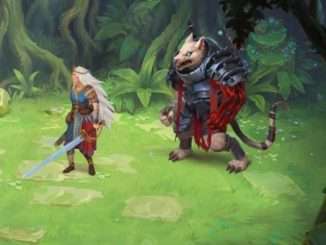
50% of the time, it works 100% of the time.
Guide to Arra-Ara’s Strongest End-Game Comp in Depth
Intro
PSA: This is the correct name for SharAura.
Arra-Ara without a shadow of a doubt have the highest potential strength of any comp against -every- enemy, boss and epilogue in the game.
They also have the highest variance, dependencies and skill cap. For those of you used to MTG terminology, Arra-Ara is the epitome of the Spike player: Infinite or Bust!
The Logic
Highest strength cap:
From an experienced competitive TCG viewpoint it’s pretty obvious why these two have the highest potential to break the game for 3 reasons:
- Tons of 0-cost card options, most of which directly feed both:
- Cheap multiplier/exponential damage vehicles and
- Unrivalled access to the only resources that really matter: Card draw and energy (also card search/filtering)
Even against greed is not -that- hard to loop your deck forever, or at least until the exponential growth 1/2 hit KO’s it. A good act 1 setup will see you kill everything in the first or second turn of combat. Even enemies like berserker designed to hurt combo get steamrollered before they can actually disrupt you.
Highest variance
There are quite a few dependencies to make these kinds of runs happen, it takes skill, resources, some luck and using good heuristics to make it happen, hence why their global win-rate is so low. If you looked at winrates for higher difficulties with experienced players, it would be quite a different distribution. Anyone who’s played LoL and sees a low global win-rate champ get nerfed because of Pro play abusing it knows what I mean…
The Setup
Arra-Ara is very much more of an end-game team-up being more dependant on embellishments and unlocks. They excel when access to gold or cards is limited and enemies are tougher and more damaging. So what’s essential?
Embellishments:
- Replace 2 x strike & defence
- 2 x alchemist
- 2 x faeria wells
- 2 x Bonus Gem
- 3 x Gem & socket chances
Levels in vault/replacement rarity and starting life are nice but not essential.
Higher team unlocks for the gems is more important than higher card unlocks.
The Strategy
- Build a value engine that allows you keep drawing and playing.
- Have some cards/filler that provide incidental value for 0 energy &/redraw.
- Build around 2-3 win conditions that gain multiplicative value from “free” actions.
This means be highly selective in your card choices, if it doesn’t fit into one of those three categories, don’t take it if you can avoid it
Doing this right means playing through your deck creates enough excess energy to pay for your win condition cards/random other cards hat snuck in, with enough card draw to delay hitting 0 hand as long as possible.
Sharra’s Deckbuilding
Sharra card priority
The engine (Create daggers & energy):
- Dragon spirit (Max 1)
- Concentrate (Essential)
- Fan of Knives
- Juggler
- Reload
- Adrenaline Rush (not great)
- Rally (if you have 3 allies in the deck)
- Recall (if vs. mist)
Incidental value:
- Warcry (1-2 Essential)
- Quickstrike
- Parry
- High Five (bad)
- Windstorm Charger
- Dagger cage (1 of max, not great without the convert block to damage rune)
- Jab
- Shock & awe
Win conditions:
- Flurry
- Blade dance
- Slice & dice
- Daggerstorm (If you have recall)
- Blade twist (If your deck is very lean OR you have good bleed runes/items)
Tech/Support
- Horse master (One or even two can be useful for hitting melee/ranged reductions)
- Mentor (Only if you need to put a spirit gem somewhere…)
- Glider (If you have the engine but not a great win condition this can help you stall)
Sharra’s engine is more about energy generation than card draw, though has pseudo-card advantage with dagger creation. Burn these to Concentrate (Or if you’re sneaky, burn them to Fan of Knives to double-trigger dissolve procs on Aurora). The other benefit is Sharra can remove the excess cards from your deck that aren’t a part of the machine for both value and consistency.
Sharra is weaker at card draw, so make sure you’re building plenty into Aurora’s deck!
Aurora’s Deckbuilding
Aurora card priority
The engine:
- Aurora’s Dream (Get later on if possible)
- Kappa study
- Fill the Pot
- Calculate (only with cost-reducing runes)
- Guide
- Fateweave
- Trance
- Tea Time
- Aurora’s promise (max 1)
- Seer
- Split the Timeline
- Windfall (Bad)
Incidental value:
- Enchant Weapon
- Witstrike (with cost reduction)
- Phantasmal Might (With cost reduction)
- Time stop
Win conditions:
- Disciple
- Hailstorm
- Splash (not as good)
Tech/support
- Eureka (As many as you can, ultimate value card for setup, but not actually part of the engine)
- Kappa growth (Because why not, also dissolve)
- Luduan (If you’ve not hit enough faerie wells you might need, but he’s not great)
- Humbling vision (Can be good to have as a one-of to survive if you stall for a turn)
Aurora is, of course, all tech no trousers as they say. Mountains of support and enablement, but really only 3 damaging cards that are worthwhile (Other than the hilarious amount of damage you can passively get from sipping at full health).
Aurora has more card options than Sharra, but depends on runes more to reduce some key costs or to duplicate bomb-spells like dream. She also has more access to cheap draw, so adding primal skull to something like fateweave is highly recommended as engine-fuel.
Gems, Items & Tips
Gem priorities
The engine:
- Scholar shard
- Shadowed Gem (mostly bad, use for something like witstrike)
- Focused Prism (mostly bad, only on a 0-cost)
- Archers/Heroic/clash/snipestone (Remember doubles stack!)
- Crystallized Faeria (Combos with mirror moonstone well)
- Mirror Moonstone (Best for 0-cost enablers)
- Gem of the scholar
- Kaleidoscopic Prism (Put this on Aurora’s dream if you can, it copies the current cost)
- Singularity (Combo with primal skull or your win-cons)
- Drop of Echoes
- Primal skull (On a 0-cost draw spell, essential as a 1-of)
- Blinding topaz (Ideally in combo with your primal skull)
Incidental value:
- Diamonds
- Raw/mighty ruby
- Shard of hunting
Win conditions:
- Gem of Gravity
- Blood Crystal/Garnet (garnet only for hailstorm)
- Blood Diamond
Tech/support
- Gem of growth/evolution
- Golden sphere (On any damaging cards you want to get rid of)
- Bronze boomerang (Useful with things that stack like fill the pot)
- Summoning crystal (Stick it on the most expensive ally)
Items/traits
Pretty obvious by now, prioritise items that give card draw/energy (even if only for 1 turn), then vision items, then offensive items, then defensive items. Anything with “Every X times do Y” is pretty good. Anything with “at the start of your turn…” other than “Add energy/cards” is pretty bad.
That “Draw a card when you have 0 cards in hand” is busted though….
Tips
- Be very selective in your card choices, if it’s not on the list it’s not coming in.
- Double-slots can be hugely useful, value them highly.
- It doesn’t matter whether your engine/value/wincons come from items, runes or cards, you just need all 3 from somewhere.
- If you’ve not got something that clearly adds value to the plan, don’t go out of your way for it, save the ink for the next act!
- Sometimes it just won’t come together, but you’ll find out in act 1 usually. This isn’t the strongest overall comp, it’s just got the highest potential ceiling if you’re stuck. Also it’s outrageously satisfying when it works.
- Aurora is your tank. Deal with it. Position accordingly.
- Don’t feel you have to commit to your win-cons early, focus on the engine initially, the incidental should get you through act 1.




Be the first to comment